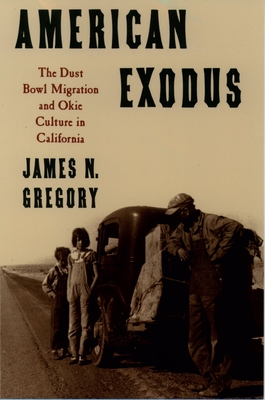American Exodus: The Dust Bowl Migration and Okie Culture in California

American Exodus: The Dust Bowl Migration and Okie Culture in California
Fifty years ago, John Steinbeck's now classic novel, The Grapes of Wrath, captured the epic story of an Oklahoma farm family driven west to California by dust storms, drought, and economic hardship. It was a story that generations of Americans have also come to know through Dorothea Lange's unforgettable photos of migrant families struggling to make a living in Depression-torn California. Now in James N. Gregory's pathbreaking American Exodus, there is at last an historical study that moves beyond the fiction of the 1930s to uncover the full meaning of these events.
American Exodus takes us back to the Dust Bowl migration of the 1930s and the war boom influx of the 1940s to explore the experiences of the more than one million Oklahomans, Arkansans, Texans, and Missourians who sought opportunities in California. Gregory reaches into the migrants' lives to reveal not only their economic trials but also their impact on California's culture and society. He traces the development of an "Okie subculture" that over the years has grown into an essential element in California's cultural landscape.
Gregory vividly depicts how Southwesterners brought with them on their journey west an allegiance to evangelical Protestantism, "plain-folk American" values, and a love of country music. These values gave Okies an expanding cultural presence their new home. In their neighborhoods, often called "Little Oklahomas," they created a community of churches and saloons, of church-goers and good-old-boys, mixing stern-minded religious thinking with hard-drinking irreverence. Today, Baptist and Pentecostal churches abound in this region, and from Gene Autry, "Oklahoma's singing cowboy," to Woody Guthrie, Bob Wills, and Merle Haggard, the special concerns of Southwesterners have long dominated the country music industry in California. The legacy of the Dust Bowl migration can also be measured in political terms. Throughout California and especially in the San Joaquin Valley Okies have implanted their own brand of populist conservatism.
The consequences reach far beyond California. The Dust Bowl migration was part of a larger heartland diaspora that has sent millions of Southerners and rural Midwesterners to the nation's northern and western industrial perimeter. American Exodus is the first book to examine the cultural implications of that massive 20th-century population shift. In this rich account of the experiences and impact of these migrant heartlanders, Gregory
Descrierea produsului
Fifty years ago, John Steinbeck's now classic novel, The Grapes of Wrath, captured the epic story of an Oklahoma farm family driven west to California by dust storms, drought, and economic hardship. It was a story that generations of Americans have also come to know through Dorothea Lange's unforgettable photos of migrant families struggling to make a living in Depression-torn California. Now in James N. Gregory's pathbreaking American Exodus, there is at last an historical study that moves beyond the fiction of the 1930s to uncover the full meaning of these events.
American Exodus takes us back to the Dust Bowl migration of the 1930s and the war boom influx of the 1940s to explore the experiences of the more than one million Oklahomans, Arkansans, Texans, and Missourians who sought opportunities in California. Gregory reaches into the migrants' lives to reveal not only their economic trials but also their impact on California's culture and society. He traces the development of an "Okie subculture" that over the years has grown into an essential element in California's cultural landscape.
Gregory vividly depicts how Southwesterners brought with them on their journey west an allegiance to evangelical Protestantism, "plain-folk American" values, and a love of country music. These values gave Okies an expanding cultural presence their new home. In their neighborhoods, often called "Little Oklahomas," they created a community of churches and saloons, of church-goers and good-old-boys, mixing stern-minded religious thinking with hard-drinking irreverence. Today, Baptist and Pentecostal churches abound in this region, and from Gene Autry, "Oklahoma's singing cowboy," to Woody Guthrie, Bob Wills, and Merle Haggard, the special concerns of Southwesterners have long dominated the country music industry in California. The legacy of the Dust Bowl migration can also be measured in political terms. Throughout California and especially in the San Joaquin Valley Okies have implanted their own brand of populist conservatism.
The consequences reach far beyond California. The Dust Bowl migration was part of a larger heartland diaspora that has sent millions of Southerners and rural Midwesterners to the nation's northern and western industrial perimeter. American Exodus is the first book to examine the cultural implications of that massive 20th-century population shift. In this rich account of the experiences and impact of these migrant heartlanders, Gregory












